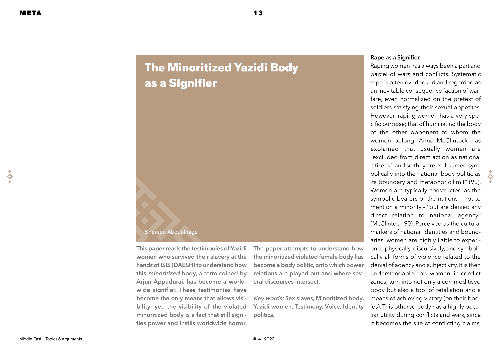The Minoritized Yazidi Body as a Signifier
This paper reads the testimonies of Yazidi women who survived their slavery at the hands of ISIS (DAESH) to understand how this ‘minoritized’ body, a term coined by Arjun Appadurai, has become a worldwide signifier. Due to the circulation of images and technologies, the testimonies of those women wh...
保存先:
| 出版年: | Middle East - Topics & Arguments |
|---|---|
| 第一著者: | |
| フォーマット: | Artikel (Zeitschrift) |
| 言語: | 英語 |
| 出版事項: |
Philipps-Universität Marburg
2020
|
| 主題: | |
| オンライン・アクセス: | オンライン・アクセス |
| タグ: |
タグなし, このレコードへの初めてのタグを付けませんか!
|
| 要約: | This paper reads the testimonies of Yazidi women who survived their slavery at the hands of ISIS (DAESH) to understand how this ‘minoritized’ body, a term coined by Arjun Appadurai, has become a worldwide signifier. Due to the circulation of images and technologies, the testimonies of those women who survived have become the only means that allows visibility; yet, the visibility of the violated minoritized body is a fact that still signifies power and instills worldwide horror. The paper attempts to understand how the minoritized individual body has become a body politic, onto which power relations are played out and where several discourses intersect. |
|---|---|
| DOI: | 10.17192/meta.2020.14.8257 |
